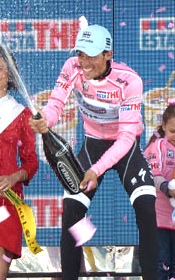
Seventeen months after testing positive for clenbuterol during the 2010 Tour de France, Alberto Contador—or rather, those who seek to have him punished—will finally have their day in court. After a provisional suspension, a one-year suspension recommendation, a surprising clearing of all charges, and more delays than I care to Google, the sport will get a final answer on whether or not all the wins Contador has collected since last July will actually count.
Previous CAS decisions strongly suggest the outcome will not be favorable for Contador. Alessandro Petacchi had been cleared to compete by his national federation when the CAS restored a one-year sentence agaisnt him for turning up too much of a substance for which he already had a TUE. Even more forebodingly, the panel actually extended a suspension against Danilo Hondo when he appealed a one-year national federation sentence.
Despite the looming gallows, fan opinion and professional punditry seems to be that regardless of the outcome, the case has been a mess, and a black eye for the sport. “Cycling has already lost” Cycling Weekly’s Nigel Wynn declared last week. Even the generally cool-headed John Leicester admits that “A satisfying ending that ties up the loose ends looks unlikely”.
I hate to speak for the establishment here, but “satisfying endings” are not and should not be the end goal of the anti-doping efforts. The system exists to create an environment where athletes can compete fairly; by definition, such a system should protect against capricious enforcers as readily as unscrupulous competitors.
Sadly, drug testing in cycling has a long history of being inconsistent and outright unfair. In 1977, Joop Zoetemelk received a 10 minute penalty for a positive dope test; the next year, Michael Pollentier was ejected and suspended for 2 months trying to evade a similar control. In the 1979 edition, Zoetemelk tested positive again and indeed, admitted the offense—but was still allowed to keep his stage win and second place overall finish.
In more recent memory, the 2006 Tour saw riders “voluntarily” withdrawn from the TDF on rumors of involvement in a drug scandal. This extrajudicial exclusion had the deliciously poetic conclusion of seeing Floyd Landis become only the second rider in a century of Tours to be stripped of his title post-race. While Michael Rasmussen’s expulsion the following year for whereabouts violations was at least in passing accord with previously-agreed-upon rules, its sudden, rumor-fueled emergence two weeks into the event smacked of a witch hunt.
Contador’s case, on the other hand, has proceeded with the mind-numbing plod of bureaucratic pedantry. This isn’t to say that the sport’s governing bodies have been meticulous in discharging their duties—the UCI was woefully slow in reporting the test results to Contador, and it allegedly took the threat of reporters breaking the (not-legally-relevant) plasticizers case to put the story public.
But the layers of appeal and recourse laid about before both Contador and his accusers like so many red carpets is a refreshing sight in contrast with that autocracy of years past. This otherwise even-handed treatment of the case highlights the current system’s more ludicrous elements—foremost among them, leaving nation sport federations (as opposed to nation anti-doping organizations) with final responsibility over athlete sanctions.
It may be frustrating to watch suspected riders continue to tear up the opposition as their cases progress, but it’s a lot easier to strike a name out of the record books than to pencil one back in. Returning to the example of 2006, Oscar Pereiro did eventually receive his trophy, but I still don’t see any mention of Allan Davis contending for wins on that year’s sprint stages. And while Alejandro Valverde’s denials may have won him a few seasons of freedom following Operacion Puerto, he found out last year that the sport has developed a rather long memory both for sanctioning dopers and annulling their results.
Indeed, for all the past (and current) ineptitude of those running it, cycling should be credited for allowing its false champions to be unmasked (and unpaid) in the lab. While parallels to professional baseball’s steroid era have abounded over the past decade, most of the discussion in MLB now revolves around asterisks in record books, not vacating World Series titles.
There was a time not so long ago when this impressive judicial leeway sent clean riders into panic attacks at the mere appearance of mail from the UCI. If 18 months of appeal and proper deference to preceding judgements is what it takes to make due process as important as punishing the offenders, then it’s a wait that I’m more than willing to endure.
Everyone has already jugded him..but i trully believe he’s not guilty…at least he did cheat and the only thing i hope is the process to end asap for the future of pro cycling.
https://www.amazon.com/Ethics-Doping-Anti-Doping-Redeeming-Sport/dp/0415484669
This is an interesting explanation about this subject. Since most who post here are actually interested in intelligent discourse and perhaps even learning something, I highly recommend this book. (Disclaimer: my wife is involved with this publisher as an editor in the series but gets no remuneration for her services)